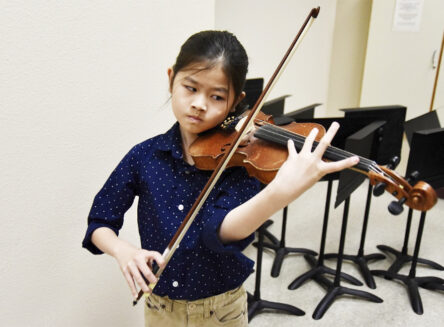
Young Polson Musician Drawn to Sound of Violin
Once 9-year-old Ziao Chen places his violin on his shoulder and puts bow to string, his calm expression transforms into one of intensity. The brightness of the violin’s tone is another language that speaks loudly for the soft-spoken Polson resident.
The youngster, whose jaw doesn’t quite yet reach the chin rest on his violin, recently gave his first performance at McClaren Hall in the Wachholz College Center alongside his instructor, and godparent, Wai Mizutani.
Unafraid to tackle a highly challenging piece, he performed “Caprice No. 24” by Niccolo Paganini, capped by an encore piece — Belgian composer Henri Vieuxtemps’ variation on “Yankee Doodle.”
During a Nov. 6 rehearsal in preparation for the performance, the instructor and student took time out to share Ziao’s journey to the big stage, accompanied by his mother Yuyu Wang Chen, father Xiao Long Chen and younger sister Seraphina.
Born in Qingdao, China, the Chens immigrated to the U.S. in 2015 when Ziao was a year and a half. The family made the move to Polson in 2018. In the winter of 2021, Ziao heard Wai play the violin for the first time and became enamored with the stringed instrument.
“I wanted to play violin because I heard Wai play in a concert and I like the high pitch sound,” Ziao said.
He received a violin for Christmas the following year. The piano, which he had been learning periodically, quickly became second fiddle. After a year and a half of lessons, and checking out an Australian violinist on YouTube, he learned more than 500 pieces including major concertos by Paganini, Tchaikovsky and Sibelius, to name a few, according to his Wai and his family.
“My first piece was Concerto Op. 35 by Oskar Rieding,” he said, an intermediate piece.
Ziao, who is home-schooled, practices three to five hours a day.
“He’s very hungry for learning,” Wai said.
Ziao said one of the hard parts about learning to play the violin is keeping the bow steady.
“You have to keep your bow steady. Not like me; I don’t keep my bow steady sometimes,” he said with a smile.
Ziao comes from a musical family. His father plays piano and is a film score composer for Chinese movies. His sister plays piano and violin and he has an older brother, Zichong, 16, who plays piano and cello.
He’s done small-scale concerts before, usually at assisted living homes, and his debut recital was held at Swank Recital Hall in the Wachholz in May, however, but he anticipated the November concert hall performance would be his biggest yet.
Ziao said he enjoys playing for people who want to listen to music “because it’s beautiful.”
Wai said he enjoys teaching youths because of their eagerness to learn.
“They’re like a sponge,” he said. “They don’t doubt too much.”
Wai said children are also eager to share music with others. This is important to Wai, who hopes to instill in students that music can be a form of community service, often organizing free concerts at assisted living centers.
“I really like them to serve the community at their younger age to create the habit to serve people — to bring the joy of music to the community,” he said.
After a bit of rehearsing, Ziao walks over to place his violin back in its case, when something gray and fuzzy peeks out from underneath the well-worn instrument. His mother picks up the violin with a smile and turns it over to show a little stuffed animal in the shape of a seal, strapped to the violin with rubber bands, which her son uses as a shoulder cushion. The little plush toy from McDonald’s is his lucky charm named Haipokemon. With a chuckle, she searches for the extra plushies she purchased as backups in case the original was lost or in disrepair.
Outside of violin, Ziao enjoys painting. He’s a whiz at math and science and loves learning about astronomy, cosmology and geology.
“He wants to go to NASA to play the violin,” his mother said with a laugh.
Wai said the magic of music is that it’s a universal language and art form that can be expressed with no age limits or boundaries.
“They can speak the truth, the truthfulness of their heart through music,” he said.
Yuyu recalled the time she asked her children if they wanted to play an instrument.
“They say, ‘Yes.’ I said, ‘I’m so glad that you like it because that’s your second language and you can use it at the hardest time in your life. Or when you’re very, very happy or very, very sad,’” she said, to help them work through the emotions.
“My husband has taught us many times that the music is the language closest to God,” she said.